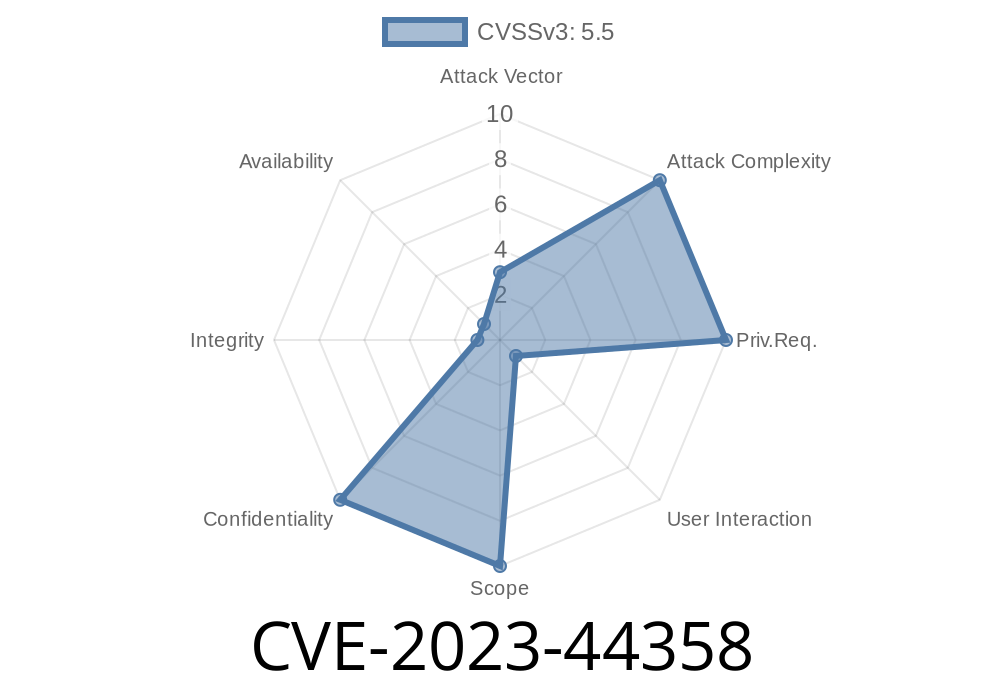Adobe Acrobat Reader is one of the world’s most popular PDF readers. It’s found on millions of computers across the globe—at home, work, and in government offices. Because it's so widely used, vulnerabilities in Adobe Acrobat Reader are high-value for both attackers and defenders.
In late 2023, a serious vulnerability was discovered: CVE-2023-44358. This post dives deep into what this bug is, why it matters, and how an attacker can exploit it. We’ll cover code snippets, how exploitation might work, mitigation tips, and point you to the best references.
What Is CVE-2023-44358?
CVE-2023-44358 is an out-of-bounds read vulnerability in Adobe Acrobat Reader. Specifically, affected versions are:
20.005.30524 and earlier (Acrobat DC Classic 202)
An out-of-bounds read occurs when software tries to read data past the end (or before the start) of a buffer. This can cause the program to read memory it shouldn’t—potentially revealing sensitive internal information, such as:
Cryptographic keys or tokens
This vulnerability requires that the victim open a malicious PDF file. Exploiting this bug can help attackers defeat security features like ASLR, leading to further compromise.
Technical Deep Dive
Let’s break down what actually happens. While Adobe hasn’t published exact source code of the vulnerable function, we can infer a pattern based on similar PDF parsing bugs.
Here is a simplified pseudocode example that shows how out-of-bounds reads happen
char buffer[256];
int length;
// 'length' is controlled by the PDF being parsed
memcpy(dest, buffer, length);
If length is not properly checked, it can be set to 512 (or more) and read way past the end of buffer. This allows the attacker to read extra memory.
Realistic JavaScript Snippet (Triggering the Bug)
Many Acrobat attack chains use embedded JavaScript. Here’s a hypothetical snippet in a malicious PDF:
// This is just for demonstration. Real exploits are more complex.
var arr = new Array(100);
for(var i = ; i < 100; i++) {
arr[i] = String.fromCharCode(x41); // Fills arr with 'A's
}
// Trigger out-of-bounds read (simulated)
app.alert(arr.join(""));
The real bug would be triggered deep in Adobe’s PDF parser, where data from the file is copied to or read from a buffer that the attacker can control.
Why does this out-of-bounds read matter?
Modern operating systems use Address Space Layout Randomization (ASLR) to protect against memory corruption attacks. ASLR randomizes where code and data are loaded in memory. If an attacker can read past the end of a buffer, they might leak addresses that reveal the ASLR offsets.
Here’s how an attack could unfold
1. Attacker crafts a malicious PDF that, when opened, causes Acrobat to perform an out-of-bounds read.
Acrobat leaks a memory address from outside the intended buffer (for example, part of a loaded DLL).
4. Attacker gets the leaked info and can use it to bypass ASLR in a follow-up exploit—making further attacks (like code execution) much easier.
Remember: This vulnerability itself does not allow direct code execution, but greatly lowers the bar by exposing guarded memory information.
Proof-of-Concept Structure
Responsible disclosure rules mean full public exploit code isn’t available—plus, actual exploit code would be illegal and unsafe to share. However, here’s what a PoC test case could look like for researchers:
# Step 1: Create a PDF with malformed streams that will cause out-of-bounds read
# Step 2: Embed JavaScript to trigger the bug
# Step 3: Observe process memory or crash dumps for leaked data
You might use a tool like PDFid to modify PDF structure, and Procmon or a debugger to catch memory leaks.
How Serious Is This?
According to Adobe and third-party advisories, CVE-2023-44358 has a CVSS base score of 5.5 (Medium). But in practice, any bug that leaks memory is a big deal, especially when chained with other vulnerabilities.
For End Users
- Update Now: Go to Adobe’s download page and grab the latest version.
For Security Teams
- Monitor for Suspicious PDFs: Use email gateways and endpoint protection to catch risky attachments.
For Developers and Researchers
- See the Vendor Advisory and NIST NVD Entry.
References
- Adobe Security Bulletin APSB23-34
- NIST NVD: CVE-2023-44358
- ASLR Explained (Wikipedia)
- PDFid by Didier Stevens
Final Thoughts
CVE-2023-44358 highlights why even info-leak bugs matter. Out-of-bounds reads don’t just crash programs; they lay the groundwork for much worse attacks by leaking secret information like ASLR offsets. If you use Adobe Reader, updating is critical. If you defend networks, be alert for malicious PDFs, and educate your users.
Timeline
Published on: 11/16/2023 10:15:13 UTC
Last modified on: 11/22/2023 17:04:35 UTC
